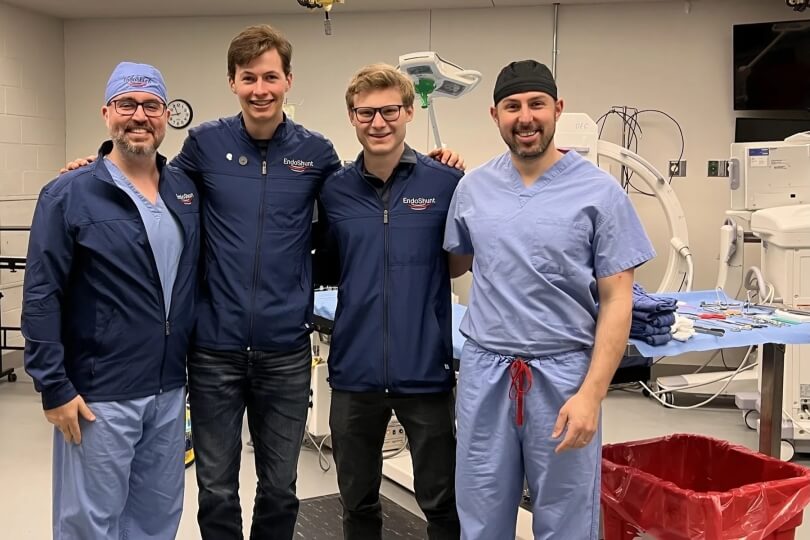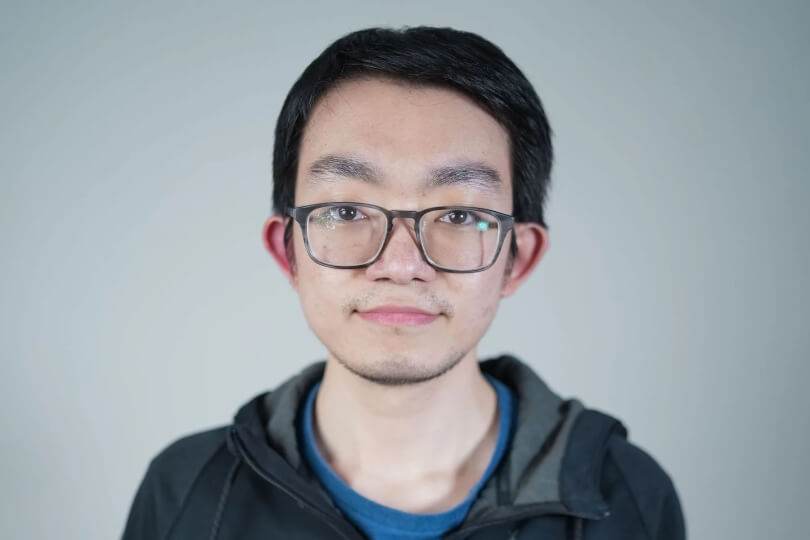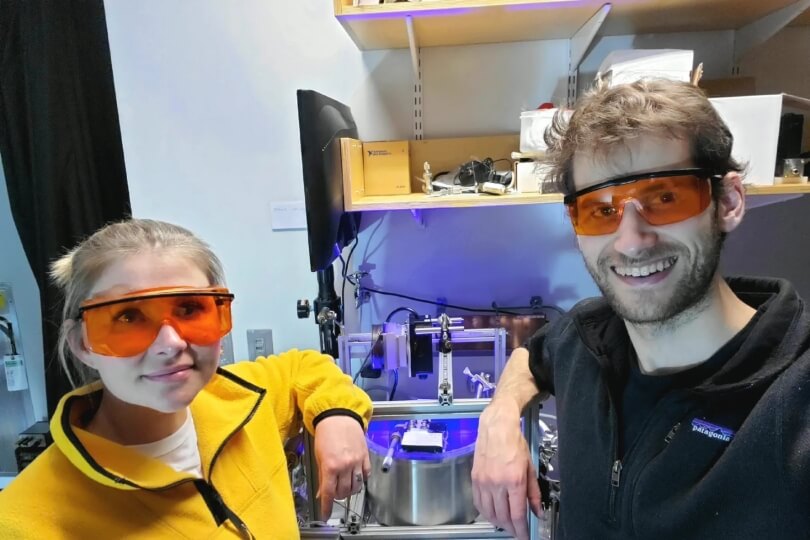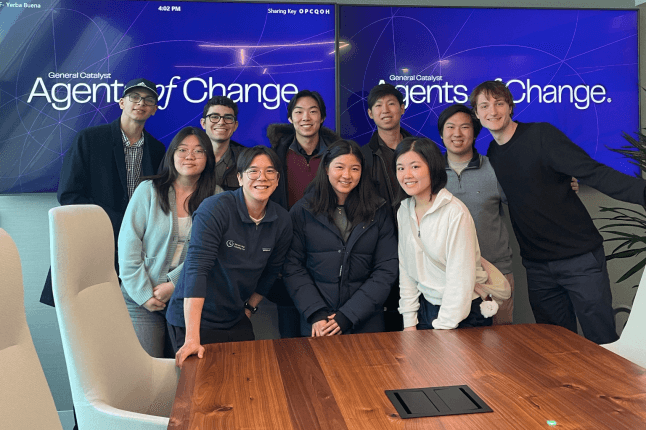News
EndoShunt co-founding team, including mechanical engineering Ph.D. student Michael Finn-Henry
Seven start-ups founded by students at the Harvard John A. Paulson School of Engineering and Applied Sciences (SEAS) have been named finalists for the Harvard Innovation Labs President’s Innovation Challenge. The start-ups will compete for a share of $515,000, given to first-place and runner-up ventures in each of five tracks, at the President’s Innovation Challenge Awards Ceremony on May 1 at Klarman Hall at Harvard Business School.
EndoShunt, co-founded by Michael Finn-Henry, a Ph.D. candidate in mechanical engineering at SEAS, is competing in the Health & Life Sciences track. Finn-Henry is developing a device to make it easier for trauma surgeons to treat abdominal bleeds. Deployed through a catheter, the device allows blood to flow normally through the abdomen, quickly stabilizing the patient while the surgeon locates and repairs the injury.
“There are two major blood vessels in the abdomen, and the shunt is deployed through the entire length of each one,” Finn-Henry said. “Now they’ve gone from about to die in two minutes from blood loss to stable. From there, you can adjust the length of the device to target exactly where the bleed is. If you shorten it until the blood starts pooling again, you can use it to diagnose exactly where the injury is.”
Finn-Henry began working on EndoShunt as an undergraduate at Vanderbilt University. Since coming to SEAS, he’s guided the company through a pre-seed fundraising campaign through the Allston Venture Fund. EndoShunt was recently nominated for Chicago’s MHub Foundation Excellence in Engineering Award, and is a finalist for the Rice Business Plan Competition.
“We’re now on an expedited regulatory path, which means the U.S. Food & Drug Administration guidance indicates that we can potentially save enough lives and have a safety and efficacy profile that means we may not have to do human trials,” Finn-Henry said. “We’ll still need to do human factors testing, where we give trauma surgeons our entire training protocol and have them use the device on a simulator. We want someone who’s never used the product before to be able to pick it up and intuitively know how to use it.”
Vocadian co-founder Yujie Wang, MDE '24
SEAS start-ups Vocadian and MesaQuantum are competing in the Open track. Vocadian, co-founded by Master of Design Engineering (MDE) student Yujie Wang, is an artificial intelligence-powered software platform that uses voice biomarkers and machine learning to assess fatigue and sleepiness with human speech. It allows managers to optimize shift schedules and task dispatch, protecting workers and leading to financial savings for companies.
“We’re focused on high-stakes, safety-sensitive industries, such as transportation and logistics, mining, construction, aviation and healthcare – workers who frequently have long shifts and suffer from fatigue or burnout risks,” said Wang. “The workers conduct voice assessments before their regular shifts to get fatigue levels and performance forecasts, which act as fit-for-duty screening and safety training and enable personalized interventions.”
Vocadian recently took first place at the MIT $100K Entrepreneurship ACCELERATE Competition, and runner-up at the Leo Lion Foundation’s Future of Capitalism startup competition in London. Wang came up with the idea with his advisor Dr. Charles Czeisler, the Director of Sleep Medicine division at Harvard Medical School, after noticing how his own voice changed due to sleep deprivation. He then began surveying research on the voice as a fatigue and sleepiness indicator.
“I saw a lot of research into using the voice as a potential marker for Parkinson’s disease, mental health and respiratory diseases,” Wang said. “Voice markers could be applied to many different diseases, but not sleep deprivation. Around that time, a friend of mine got into a car accident because someone fell asleep in their car. That made me think about work-related fatigue, how that affected circadian health and sleep deprivation, and how the voice could be a nonintrusive way to predict and intervene before these accidents happen.”
MesaQuantum was co-founded by Wale Lawal, MS/MBA ‘24. The start-up is developing chip-scale clocks that use quantum sensing technology to work as global positioning systems. This technology has applications in autonomous vehicles, deep-sea exploration, defense, and infrastructure monitoring.
Two SEAS start-ups are competing in the Alumni & Affiliates: Open track. Beaver Health is co-founded by former computer science concentrator Emily Wang, A.B. ‘17, and offers AI-enabled assistive technologies to improve the health and well-being of older adults and their caregivers. Neuronspike, co-founded by Dovran Amanov, S.M. ‘21, is developing generative artificial intelligence for automating business operations.
MicroAvionics co-founding team, including applied physics Ph.D. student Ben Schafer
MicroAvionics is one of 10 start-ups competing for an Ingenuity Award for Innovation Lab members with promising ideas. The company is co-founded by Ben Schafer, a Ph.D. student in applied physics in the group of Joost Vlassak, Abbott and James Lawrence Professor of Materials Engineering. Spun out of Schafer’s research at SEAS, MicroAvionics is developing lightweight devices that can levitate in the atmosphere without any onboard power or moving parts. Such devices could be used in telecommunications, climate science and defense.
“One of the biggest things I’ve learned is that you really need to know that there are people out there that are going to use your research if you’re trying to bring it into a commercial sphere,” said Schafer. “I think the research going on here at SEAS really is in the right realms of commercializability yet scientific interest to accelerate those ideas.”
Alba, co-founded by MDE students Deepika Gopalakrishnan, Binita Gupta and Priyanka Pillai, is also competing for an Ingenuity Award. Alba is a biodegradable, tactile wipe that empowers individuals who are blind or visually impaired to identify the onset of their period discreetly, safely, and independently.
Topics: Computer Science, Design, Electrical Engineering, Entrepreneurship, Events, Master of Design Engineering, Materials Science & Mechanical Engineering, MS/MBA
Cutting-edge science delivered direct to your inbox.
Join the Harvard SEAS mailing list.
Press Contact
Matt Goisman | mgoisman@g.harvard.edu





